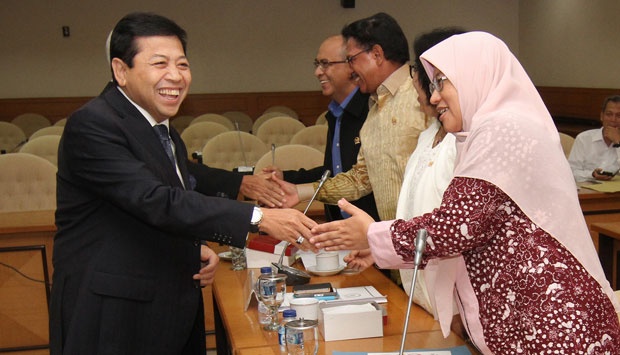Berita Terkait
- Anggaran DPR RI Tahun 2016-2018
- Kehadiran Anggota DPR Pada Masa Sidang Ke-2 Tahun 2017-2018
- Review Kinerja DPR-RI Masa Sidang ke-2 Tahun 2017-2018
- Fokus DPR Masa Sidang ke-3 Thn 2017-2018
- Konsentrasi DPR Terhadap Fungsinya Pada Masa Sidang ke - 3 Tahun 2017 – 2018
- Kehadiran Anggota DPR RI Masa Sidang ke-3 Tahun 2017-2018
- Review Kinerja Masa Sidang Ke-3 Tahun 2017-2018
- Konsentrasi DPR Terhadap Fungsinya Pada Masa Sidang ke - 4 Tahun 2017– 2018
- Peristiwa Menarik Masa Sidang ke-4 Tahun 2017-2018 (Bidang Legislasi)
- Peristiwa Menarik Masa Sidang ke-4 Tahun 2017-2018 (Bidang Pengawasan)
- Peristiwa Menarik Masa Sidang ke-4 Tahun 2017-2018 (Bidang Keuangan, Lainnya)
- Review Kinerja DPR-RI Masa Sidang ke-4 Tahun 2017-2018
- (Tempo.co) Kasus Patrialis Akbar, KPPU: UU Peternakan Sarat Kepentingan
- (Tempo.co) Ini Proyek-proyek yang Disepakati Jokowi-PM Shinzo Abe
- (Tempo.co) RUU Pemilu, Ambang Batas Capres Dinilai Inkonstitusional
- (Media Indonesia) Peniadaan Ambang Batas Paling Adil
- (DetikNews) Besok Dirjen Pajak Panggil Google
- (Tempo.co) Aturan Komite Sekolah, Menteri Pendidikan: Bukan Mewajibkan Pungutan
- (Rakyat Merdeka) DPR BOLEH INTERVENSI KASUS HUKUM
- (Aktual.com) Sodorkan 4.000 Pulau ke Asing, Kenapa Pemerintah Tidak Menjaga Kedaulatan NKRI?
- (RimaNews) Pimpinan MPR dan DPR akan bertambah dua orang
- (Warta Ekonomi) Jonan Usulkan Kepada Kemenkeu Bea Ekspor Konsentrat 10 Persen
- (Tempo.co) Eko Patrio Dipanggil Polisi, Sebut Bom Panci Pengalihan Isu?
- (TigaPilarNews) DPR Harap Pemerintah Ajukan Banyak Obyek Baru untuk Cukai
- (Tempo.co) Menteri Nasir: Jumlah Jurnal Ilmiah Internasional Kita Meningkat
Kategori Berita
- News
- RUU Pilkada 2014
- MPR
- FollowDPR
- AirAsia QZ8501
- BBM & ESDM
- Polri-KPK
- APBN
- Freeport
- Prolegnas
- Konflik Golkar Kubu Ical-Agung Laksono
- ISIS
- Rangkuman
- TVRI-RRI
- RUU Tembakau
- PSSI
- Luar Negeri
- Olah Raga
- Keuangan & Perbankan
- Sosial
- Teknologi
- Desa
- Otonomi Daerah
- Paripurna
- Kode Etik & Kehormatan
- Budaya Film Seni
- BUMN
- Pendidikan
- Hukum
- Kesehatan
- RUU Larangan Minuman Beralkohol
- Pilkada Serentak
- Lingkungan Hidup
- Pangan
- Infrastruktur
- Kehutanan
- Pemerintah
- Ekonomi
- Pertanian & Perkebunan
- Transportasi & Perhubungan
- Pariwisata
- Agraria & Tata Ruang
- Reformasi Birokrasi
- RUU Prolegnas Prioritas 2015
- Tenaga Kerja
- Perikanan & Kelautan
- Investasi
- Pertahanan & Ketahanan
- Intelijen
- Komunikasi & Informatika
- Kepemiluan
- Kepolisian & Keamanan
- Kejaksaan & Pengadilan
- Pekerjaan Umum
- Perumahan Rakyat
- Meteorologi
- Perdagangan
- Perindustrian & Standarisasi Nasional
- Koperasi & UKM
- Agama
- Pemberdayaan Perempuan & Perlindungan Anak
- Kependudukan & Demografi
- Ekonomi Kreatif
- Perpustakaan
- Kinerja DPR
- Infografis
(Tempo English) Payoff

Setya knows when he needs to serve the powerful, when to lobby, to make friends, to appease his political foes or to share his gain with others. He is a prototype of today's politicians, when politics means a way of getting to the top, not a way to serve the people.
Setya, 59, left his hometown of Bandung to become a businessman but eventually ended up in politics. He is said to own no fewer than 14 companies from real estate to cafeterias. In 2009, his recorded financial assets totaled Rp73.79 billion and US$17,781 more than double the figure for the previous year.
When President Suharto was at the peak of his power, Setya published a book called The Management of President Suharto, a collection of positive commentaries by 17 ministers. Besides making a profit the book was a bestseller Setya gained something else: political influence. He began to be taken more seriously by Golkar leaders.
Setya survived when Suharto fell from power, and even gained when dictatorship was replaced by democracy. Last month, Setya Novanto may have reached the peak of his political career when he became speaker of the House of Representatives (DPR). He met all the requirements needed to lead the legislature: support from a major party, experience and political agility. But one could say he lacks one important factor: integrity.
An investigation by Tempo produced testimonies from more than a dozen people on the financial methods Setya used to achieve his objectives. These witnesses said that Setya paid money and gave bonuses to Golkar Party chiefs in the regions during party conventions to buy votes and influence. He was also the main Golkar contributor supporting presidential candidate Prabowo Subianto. Not surprisingly, Golkar leaders and members of the pro-Prabowo coalition agreed to back Setya's nomination for the position of DPR speaker.
The Corruption Eradication Commission (KPK) should step in. The law states that people who pay and take bribes are criminally liable. The fact that so many people are involved means the KPK has a much better chance of finding a justice collaborator.
It is not the first time that Setya's name is linked to corruption cases. In 1999, he was a suspect in the Rp904 billion Bank Bali cessie case, in the transfer of Bank Bali's debt collection rights, with the smuggling of Vietnamese rice and the importation of toxic waste to Galang Island in the Riau Archipelago, and many more. The fact that a person like Setya managed to become a DPR speaker confirms reports that the legislature could very much be a nest of corruptors. Allowing Setya and his cases to simply fade away would be an insult to our legal system.